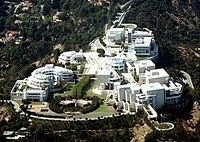 The Getty Center campus as viewed from the south | |
| Established | December 16, 1997 |
|---|---|
| Location | 1200 Getty Center Drive Los Angeles, California |
| Coordinates | 34°04′39″N 118°28′30″W / 34.07750°N 118.47500°W |
| Type | Art museum |
| Visitors | >1,400,000 (2019)[1] |
| President | James Cuno |
| Architect | Richard Meier |
| Public transit access | Los Angeles Metro Bus: 233, 761 via Getty Center Tram |
| Website | www.getty.edu/center |
The Getty Center, in Los Angeles, California, is a campus of the Getty Museum and other programs of the Getty Trust. The $1.3 billion center opened to the public on December 16, 1997,[2] and is well known for its architecture, gardens, and views overlooking Los Angeles. The center sits atop a hill connected to a visitors' parking garage at the bottom of the hill by a three-car, cable-pulled hovertrain people mover.[3]
Located in the Brentwood neighborhood of Los Angeles, the center is one of two locations of the J. Paul Getty Museum and draws 1.8 million visitors annually. (The other location is the Getty Villa in the Pacific Palisades neighborhood of Los Angeles, California.) The center branch of the museum features pre-20th-century European paintings, drawings, illuminated manuscripts, sculpture, and decorative arts; and photographs from the 1830s through present day from all over the world.[4][5] In addition, the museum's collection at the center includes outdoor sculpture displayed on terraces and in gardens and the large Central Garden designed by Robert Irwin. Among the artworks on display is the Vincent van Gogh painting Irises.
Designed by architect Richard Meier, the campus also houses the Getty Research Institute (GRI), the Getty Conservation Institute, the Getty Foundation, and the J. Paul Getty Trust. The center's design included special provisions to address concerns regarding earthquakes and fires.
- ^ "TOP 100 Art museum attendance (continued from page 3)". Vol. 29, no. 322 (International ed.). The Art Newspaper. April 2020. p. 15.
- ^ "The Getty Center: Reflecting on 10 Years". Archived from the original on July 13, 2010. Retrieved August 27, 2020.
- ^ Simon, Richard (August 11, 1995). "The Art of Getting to the Getty Will Have Visitors Floating on Air". Los Angeles Times.
- ^ "About the Museum (Getty Museum)". www.getty.edu. Retrieved March 16, 2018.
- ^ "Photographs | the J. Paul Getty Museum". www.getty.edu. Retrieved March 16, 2018.


